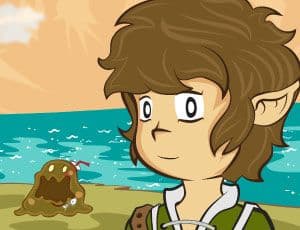Escola Games | Jogos Educativos
https://www.escolagames.com.br
Teacher's support sheet

The Elf Island
Honorable Elf,
Garbage Monsters invaded the Island, and now the Guardians need your help! Clean the island, kick out the monsters, and find the totems. That's the only way to reestablish nature's balance.

Teacher's tips
Level of Education: Elementary School
Age: 08 to 11 years old
Subjects: English - Science
This game is a tool that helps the teacher to work with environmental education in the classroom, building habits and knowledge with the students while teaching them the importance of caring for nature.
During the game, they will read information about riparian forests, reforestation, and concepts related to sustainable development.
Free online game for kids in Elementary School [FIM-DICA]
Learner outcomes
To identify the actions that help preserve the environment;
To develop cooperating, respectful, and preserving attitudes;
To analyze facts and situations about people's actions concerning trash, recognizing the need to participate in this process;
To learn about the environmental impacts caused by individual and collective actions;
To comprehend that small efforts can help the improvement of environmental quality;
To analyze facts and situations about trash, recognizing the need to participate in this process;
To raise awareness among students about the different forms of collection and destination of waste in the school, their house, neighborhood, and their city;
To develop self-assurance when solving problems;
To improve their motor coordination;
To work with the content discussed in the classroom.
Teachers' goals
To work with topics that are related to environmental education: riparian forest, pollution, fauna, flora, water, trash, and reforestation ;
To stimulate habit changes and to create new habits that favor the environment;
To promote the discussion about an individual's responsibility;
To offer the game as a didactic resource to explore the content discussed in the classroom;
To work with motor skills, focusing skills, and logical thinking;
To improve their motor coordination with the use of the mouse;
To widen students' knowledge.
Suggestions of approaches for the teacher
(Approach 1) Organize students in pairs so they talk about the information in the game and the strategies they can use to find the totems. Students must take turns guiding the Elf.
(Approach 2) When the students click on the wood logs, they read the small text. You can ask them to write in their notebooks the central information. You can also ask them to answer a quiz while they read the texts.
(Approach 3) Promote a campaign with the students. Encourage them to come up with a creative name. Organize a class to make folders, and then students should glue them in many areas of the school. The main goal is to raise awareness concerning the environment. Suggest that students focus their campaign on one main topic, such as saving water or keeping the environment clean.
(Approach 4) Eco Workshops - Organize an eco workshop with students, dividing them into groups and giving them themes to work on. Stimulate them to do research and create things that represent their topic. Then, you can invite other students to see their projects.
(Approach 5) Organize a trip to a significant park in your city.
(Approach 6) Ask students to bring ideas of things they can create with things that would go to the trash. Then, organize a day to create these objects with them.
(Approach 7) Plant with students seeds of flowers in plastic cups. Watch as it grows.
(Approach 8) Plant vegetables with the students.
(Approach 9) Encourage students to write about the environment. It can be a song, a poem, or an essay.
(Approach 10) Promote a play about the environment and invite other students to watch it.
(Approach 11) Take the students to watch the video 'Responsible Consumption for Kids - The 3R Principle: Reduce, Reuse and Recycle'. Then, promote a discussion about it, asking them to give examples of what they could do in their daily lives.
(Approach 12) After watching the video and discussing it, suggest that students write a short story related to the 3R Principle.
More about the content
The Environmental preservation theme enables the creation of an interdisciplinary project. Many themes are suitable for discussions, so the teacher must research to find different types of approaches it.
During and after the development of the project, the students have to be able to answer the following questions:
What is pollution?
What are the types of pollution?
What can pollution cause?
What is flora?
What are the main 'enemies' of flora?
Why are some species threatened by extinction?
List some o the species threatened by extinction.
What is fauna?
What is a riparian forest?
Are riparian forests important? Why?
What is the best method to discard waste?
First step:
- Observe what students already know about the topic.
Second step:
- List the local environmental problems at school, in the city, and the neighborhood.
Third step:
- Develop with students a project to solve the problems. This step doesn't have to involve the actions themselves. The most important part is to provoke students to think about possible solutions and ways to avoid these problems.
More about the environment:
Memory water
